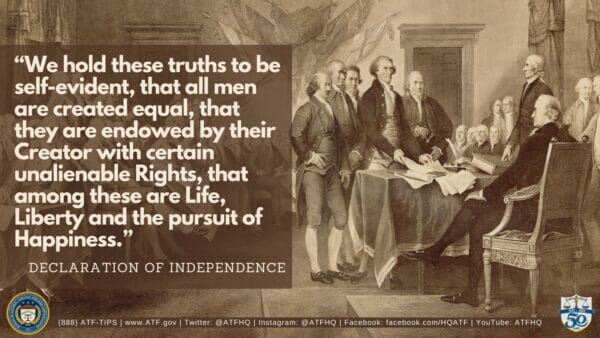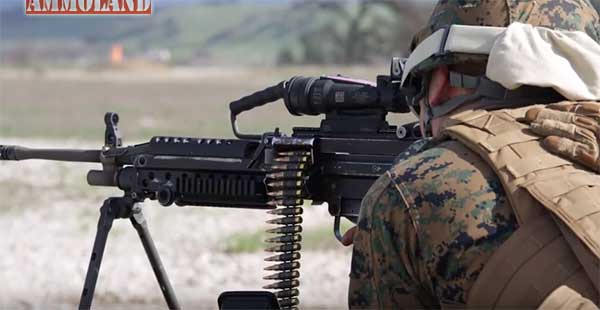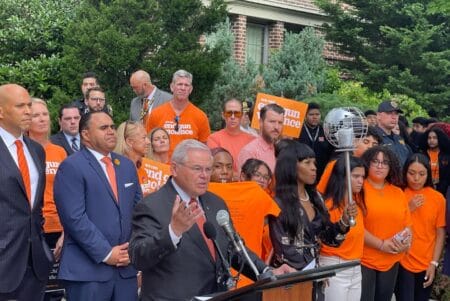
“Feds Say Wyoming Man Has No Right To Make His Own Machine Gun,” Cowboy State Daily reports, citing developments in the United States District Court for the District of Wyoming. “Jake Stanley DeWilde in January sued U.S. Attorney General Merrick Garland and the Bureau of Alcohol, Tobacco and Firearms and Explosives (ATF), saying the government wrongfully denied his application to build his own M16 machine gun and a federal ban on such weapons is unconstitutional.”
Of course, that would be ATF’s position. And their excuse, “that courts have consistently ruled that the Second Amendment protects weapons in ‘common use’ but does not protect ‘dangerous and unusual weapons,’” get a legal boost from of all people, the late “originalist” Supreme Court Justice Antonin Scalia in his District of Columbia v. Heller opinion. For reasons of his own, he felt he had to help advance that idea in the minds of those trying to justify infringements.
“Like most rights, the Second Amendment right is not unlimited,” Scalia volunteered, “[United States v.] Miller’s holding that the sorts of weapons protected are those ‘in common use at the time’ finds support in the historical tradition of prohibiting the carrying of dangerous and unusual weapons.” He used that to imply banning weapons such as “M-16 rifles and the like” would not be an infringement. Otherwise, he asserted, “it would mean that the National Firearms Act’s restrictions on machineguns … might be unconstitutional, machineguns being useful in warfare in 1939.”
You have to wonder what it takes to get through to some of these guys.
Yes, it’s unconstitutional, and that can be demonstrated logically and legally through the case and the law Scalia cited.
Miller recognized the militia as “all males physically capable of acting in concert for the common defense [and] bearing arms supplied by themselves and of the kind in common use at the time.” Its function was — and still is — to field citizen soldiers, and these citizens bore arms that were suitable for that purpose, “ordinary military equipment” intended to be taken into “common defense” battles. The militia deployed with the intent to match and best a professional military threat.
To suggest the Framers of the Constitution meant anything else is to accuse them of being insane by codifying into the supreme Law of the Land that sending an ill-equipped citizenry to their slaughter was “necessary to the security of a free State.”
Irrefutable evidence that the government knew when proposing the National Firearms Act that a ban on machineguns would be unconstitutional is presented in the Tennessee Law Review, Volume 62, Number 3, Spring 1995; A Second Amendment Symposium Issue:
“Attorney General Cummins was then asked how the peoples’ protection under the 2nd Amendment was escaped. Cummins then replied, ‘Oh, we do not attempt to escape it. We are dealing with another power (taxation and interstate commerce). You see, if we made a statute absolutely forbidding any human being to have a machine gun, you might say there is some constitutional question involved.’”
The government knew the people had a right to machine guns. The issue here is one of taxing a right as a prior restraint on exercising it.
And the unstated issue is, just like with latter-day “commonsense gun safety laws,” Cummins knew his scheme would have no effect on the criminals it was fraudulently passed to deter:
“[W]ith regard to reaching a man like Dillinger: There is nothing specific in this act that deals with that situation.”
The tax “workaround” was camouflage and subterfuge. The intent was to ban when no authority existed.
Now, in light of precedent established subsequent to the passage of the National Firearms Act, such as 1964’s Twenty-Fourth Amendment and the Supreme Court’s 1966 Harper v. Virginia Board of Elections decision abolishing poll taxes as a prerequisite for exercising voting rights, and the recent Supreme Court ruling in New York State Rifle & Pistol Association, Inc. v. Bruen establishing a “text, history, and tradition” standard, there’s really only one conclusion that can be drawn:
The National Firearms Act is unconstitutional. The same holds true for bans on “bump stocks,” pistol braces, forced rest triggers, “ghost guns,” “Glock switches,” and the like. And the treasonous “gun sense politicians” and their “only following orders” edict enforcers know it
So do all those officeholders we’re told are “staunch supporters of the Second Amendment.”
Further Reading
- “United States v. Miller and Short-Barreled Shotguns: A Critical Analysis of the U.S. Supreme Court Opinion Including an Evidentiary Presentation” by Brian C. Puckett.
- “NRA President’s Testimony During Congressional Debate of the National Firearms Act of 1934,” Introduction by Angel Shamaya
- “Well Regulated: The NFA hearings (1/6) – an unforgivable betrayal,” The Cornell Review
- “National Firearms Act Hearings,” Seventy-third Congress, Second Session
About David Codrea:
David Codrea is the winner of multiple journalist awards for investigating/defending the RKBA and a long-time gun owner rights advocate who defiantly challenges the folly of citizen disarmament. He blogs at “The War on Guns: Notes from the Resistance,” is a regularly featured contributor to Firearms News, and posts on Twitter: @dcodrea and Facebook.







EXACTLY. The senate debate of the NFA admitted they had no authority to legally police or restrict citizens’ firearms usage or selection, including full auto weapons. The Miller case stated that weapons protected by the 2nd were those for use in modern warfare, military grade weapons used in battle. They only said short barreled shotguns were not covered because there was no defense, and the gov attorney lied in saying the military didn’t use sbs’s in war.
Citizens of the United states have all the rights granted in the constitution and the government only has the rights granted to it by the citizens. Time we get back to that !
Further proves the illegitimacy of “government”.
Good morning Mr. Codrea; and let me say, right off the top, I have missed your writing. And this morning’s piece is on my number one issue. I am cautioualy hopeful the can of worms those sons-of-bitches at BUTF opened over pistol braces will lead to a greater examination of the unconstitutional NFA. Regarding the 2A, I believe the right is absolute, barring genuine chemical, radiological, bioligical and nuclear weapon WMD’s; and perhaps others yet to be developed. At minimum, to start, Hughes must be repealed, along with the absurdly onerous registration requirements. Pass the normal background check, fill out… Read more »
As I await approval for my carefully considered comment, let me post the quote it contained from Heller. If this is also delayed for approval then no need if my previous comment eventually gets posted.
“It may be objected that if weapons that are most useful
in military service—M-16 rifles and the like—may be
banned, then the Second Amendment right is completely
detached from the prefatory clause.“
Let’s try a 3rd time without quoting Heller or using digits: Dave, like so many others you are in error concerning Heller’s statement on the Msixteen. Scalia wrote that anyone who say’s Msixteens and the like can be banned have de facto separated and nullified the prefatory clause “A well regulated militia being necessary to the security of a free state,” from the operative “the right of the people to keep and bear arms shall not be infringed.” In other words, you cannot claim that the Second Amendment right is both limited to the militia and machine guns can be… Read more »